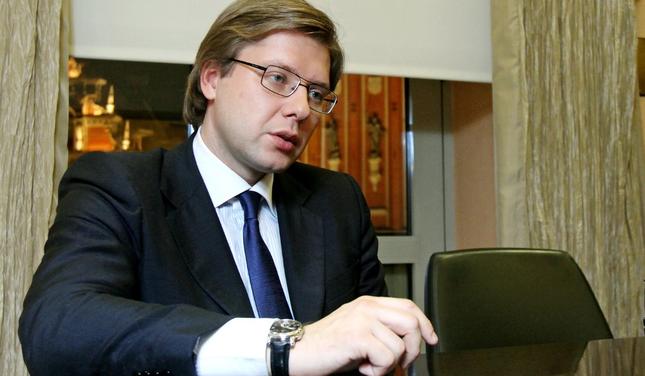
Latvia’s Russian Party Triggers Constitutional Referendum on State Language (Part Two)
Publication: Eurasia Daily Monitor Volume: 9 Issue: 34
By:

Harmony Center, the Russian party in Latvia, has triggered a constitutional referendum on the state language (see EDM, February 15). Harmony calls for Russian to become a state language, in parallel with the Latvian language. The proposal is bound to fail in the February 18 referendum. Even if all of Latvia’s Russian/Russophone voters (a Soviet-occupation legacy of at least 30 percent of the electorate) turn out and vote in favor, which is unlikely in the first place, the proposed constitutional amendments would still fall far short of the 50 percent mark. Why, then, has Harmony Center embarked on this effort?
Latvia’s election-winning coalition parties had decided to keep Harmony Center out of the government they formed in October 2011. They had compelling grounds for that decision (see EDM, October 26, 2011), despite Harmony’s Moscow-encouraged attempts to present itself as fit to govern. Following that failure, Harmony embarked on the campaign for a constitutional referendum on the Russian language. This is Harmony’s response to being left out of Latvia’s government. The referendum serves to maintain Harmony’s hold on the Russian/Russophone electorate after that failure. Triggering the referendum is a reminder of Harmony Center’s nuisance potential in Latvia, and implicitly in Russia-Latvia relations.
Harmony did not itself initiate the referendum. Local Russian fringe-nationalists initiated it in October under the leadership of Vladimir Linderman, the head of the Russian National Bolshevik party’s branch in Latvia. A strident agitator during many years on the local scene, Linderman has no political following to speak of even among Russians and invites general disrespect. The signature-collecting campaign in November was going poorly until Harmony Center lined up behind it.
Harmony leaders had long been concerned about the possibility of being outflanked by militants from the far-left. Harmony itself reached its present strength by absorbing hard-line left-nationalist elements, rather than have them operate outside Harmony and draw votes from it. That concern subsided in the last few years as Moscow withdrew its support from the militant party (“Human Rights in a United Latvia”) and helped Harmony Center to unify the Russian vote. This occurred as part of Harmony’s re-branding and preparations to claim a place in Latvia’s government. Outer-fringe groups such as Linderman’s National-Bolsheviks are not a part of this arrangement. They may yet siphon off some supporters from Harmony at the margins through initiatives such as this referendum.
Following an internal reassessment, Harmony Center apparently decided to defer the goal of joining the government and switch to more aggressive tactics. Harmony leader and Riga mayor, Nils Usakovs (Nil Ushakov), gave the signal, announcing that he would sign the referendum petition with the proposed constitutional amendments. Harmony’s organizations and its media followed suit mobilizing support for the referendum.
Up to that point, Usakovs had served as Harmony Center’s fresh face: Latvian-speaking, youthful and telegenic, and a possible coalition partner to Latvian politicians (he administers Riga in coalition with a Latvian oligarch’s party). His initiative to “personally” endorse the referendum marks the abandonment of a carefully constructed image. It must also reflect Harmony leaders’ turn to more aggressive tactics after being left out of the coalition government.
Harmony leaders know that the referendum will not turn in their favor. They do not focus directly, or mainly, on technicalities of the language issue in their campaign. Usakovs, the co-leader Janis Urbanovics, and other party spokesmen allude to a broader goal in code-phrases. They tell supporters to turn out for the referendum as a show of “self-respect,” to protest after being “offended,” to signal to the government to “sit down at the table and talk about our future.” All this alludes to Harmony Center being excluded from government, using the referendum to show the party’s strength, and hoping on that basis to re-negotiate an arrangement with Latvian political forces. Harmony Center seems to calculate that a high turnout of its supporters would provide arguments for recasting the coalition government and inviting Harmony to join it (BNS, LETA, Delfi.Lv, February 1-16).
These circumstances compel Harmony’s leaders to provide contradictory explanations for their policy. They must explain to their supporters why Harmony joined the referendum campaign midway through, only after it had been initiated by others. And they have to explain to Latvia itself why Harmony is moving against a core value of the Latvian nation while at the same time claiming a role in the country’s government.
Harmony leaders have devised one explanation for everybody: they claim that they “must side with their voters,” “be where their voters are.” This explanation may suggest an abdication of authority by the leadership to the rank and file, but such is not the case. The leadership itself is actively mobilizing its supporters to turn out for the referendum. In a narrow sense, Harmony leaders seek to prevent defections on their outer left flank. But in essence, Harmony Center is instrumentalizing this referendum – and the issue of language itself – to establish some leverage over Latvia’s political system.




